
Glen Rose’s downtown — lined with boutiques, antique shops, bookstores and cafes in early 20th century buildings — sits especially quiet on a sunny Monday afternoon … with the exception of rock haulers that rumble through the city square.
At the intersection of Northeast Barnard and Elm streets, these trucks struggle to avoid crossing the oncoming lane as they squeeze onto the narrow stretch toward to area quarries.
It worries Glen Rose city administrator Troy Hill.
“This is an unsafe situation, “ Hill said. “We believe that this is a matter of public safety, which affects everybody.”
The Glen Rose City Council passed an ordinance Dec. 12 that bans semitrucks from driving through its square. To avoid the square, truck drivers have to take county or farm-to-market roads around the city of 2,800 about 55 miles southwest of Fort Worth.
The ordinance was quickly met with legal threats.
“We are getting push back from area shipping companies, area rock quarries, in regards to the proposed alternative route,” Hill said. “We have had legal action threatened against the city. We obviously don’t want that. We are not anti-business at all. We encourage businesses to locate in our city. But, at the same time, it is our duty and our job to make sure that people here are safe.”
A letter from a law firm representing a Glen Rose quarry said the ordinance was unlawful.
The letter from Barnes & Thornburg of Indianapolis, obtained by the Star-Telegram through a records request, states that TxDOT transportation codes bar Glen Rose from placing signage to reroute truck drivers and that the alternate route must not to be “unreasonably longer than the original route” or confusing to follow.
TxDOT did not respond to a request for comment.
Barnes & Thornburg was retained by the Rogers Group, a Nashville-based construction aggregate company that operates Glen Rose Sand & Gravel.
The law firm and quarry did not respond to requests for comment.
Business concerns
Hill isn’t just looking to enforce the ordinance for the sake of public safety. He also wants to help small businesses in this city known as the “Dinosaur Capital of Texas.”
“When I started meeting downtown businesses, they voiced concerns about it,” Hill said. “They said that they believe that it affects their businesses in a negative way, that it affects the number of people that come to our town square.”
The rumbling trucks have rattled the early 20th century building that houses Front Porch Designs, owner Traci Joyner said.
“The mortar between my rocks is literally falling out. Rocks are falling off the roof, just from the vibrations alone,” said Joyner, who has owned her business for eight years.
Heather Bienko said her family’s building at 200 NE Barnard St. has sustained damage. It was constructed in 1894 and is registered as a Texas historical landmark.
“It’s an old limestone rock building,” Bienko said. “You can see where little pieces of the rock have fallen off the mortar.”
The tenants, a clothing boutique and a winery, have expressed concerns about the trucks affecting their day to day operations, Bienko said.
“They’ve said they can’t open their doors on nice days,” Bienko said. “Their area where they check people out is kind of toward the front of the building and many times they have to pause the transactions and talking to those people while these trucks go by because it’s so loud.”
Bienko is optimistic that a solution can be hashed out
“There’s no way anybody could think from a safety perspective this needs to continue,” Bienko said. “I just don’t think it’s something that can continue long term. There has to be a solution.”
Hill also hopes there is a solution but said the city can’t risk a tragedy in the meantime.
“In the short term, we would like truckers and the quarries to work with us and realize that public safety has to come first, “Hill said.
"avoid it" - Google News
February 01, 2024 at 12:08AM
https://ift.tt/mQ2DvO4
This North Texas city has asked large trucks to avoid its quaint downtown. They come anyway - Yahoo News
"avoid it" - Google News
https://ift.tt/Tg9LbnS
https://ift.tt/Gd5Lkuo



